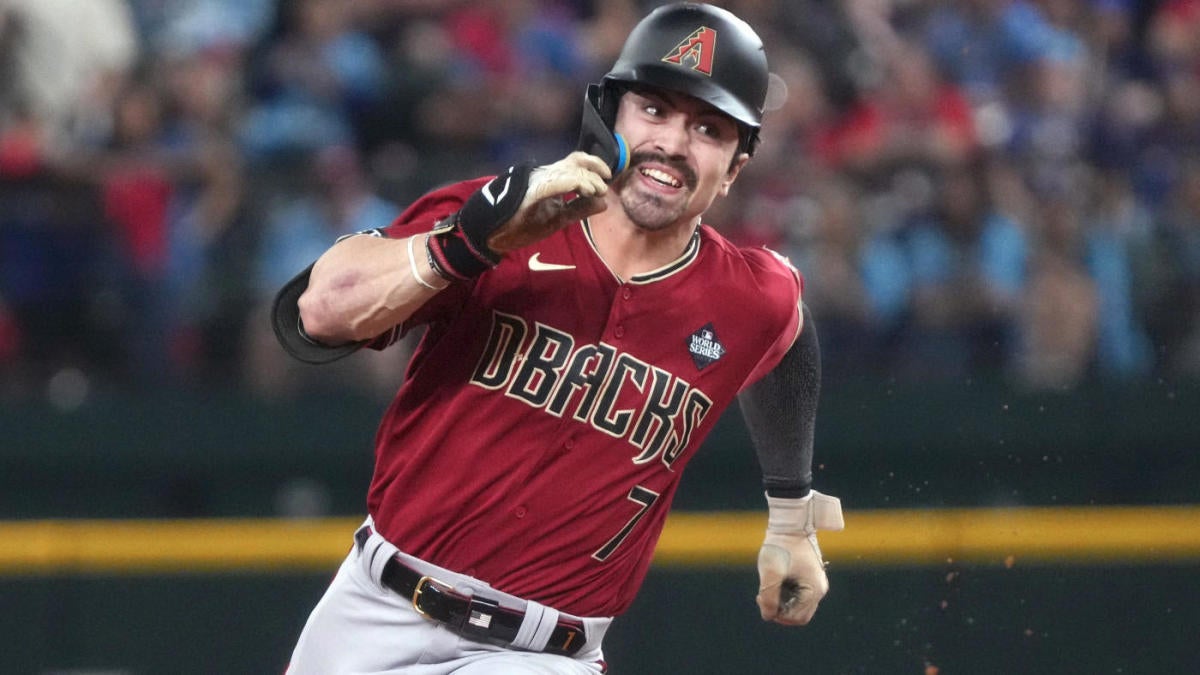As I continue my breakdown of some of the most interesting names at the outfield position with an eye on 2025 – I covered Jackson Chourio and Brent Rooker’s 2025 outlooks earlier this week – we come to Corbin Carroll, who has had one of the wildest rides I can remember a young player having over the past year or so.
This time last year, Carroll was putting the finishing touches on a consensus Rookie of the Year season, finished top-five in NL MVP voting, and had established himself as a candidate for the No. 1 overall pick in Fantasy. And why not? He was one of the top prospects in baseball, and he went out as a rookie and hit .285 with 116 runs, 25 homers, 76 RBI, and 54 stolen bases as a 22-year-old. He was unbelievably good, and many in Roto leagues did take him as high as No. 2 overall this season.
Which looked like a humongous mistake for a few months. Carroll hit just .197/.282/.291 through the first two months of the season with just two homers, and he was hitting just .213 with five homers as late as the All-Star break. Rumors swirled about Carroll’s health after a couple of scary shoulder injuries he played through last season, and the idea that he would be a first-rounder in 2025 looked completely far-fetched at the mid-way point of the season.
Now? Oh, he’s definitely put himself back into the discussion now. When Scott White did his way-too-early rankings for the first two rounds the other day, he had Carroll ranked 16th overall. And I certainly don’t think he’s going to be moving down from there after Wednesday’s game that saw Carroll go 2 for 4 with two homers, including a 438-foot bomb, giving him 16 in 54 games since the All-Star break.
Please check the opt-in box to acknowledge that you would like to subscribe.
Thanks for signing up!
Keep an eye on your inbox.
Sorry!
There was an error processing your subscription.
What went wrong for Carroll earlier in the season? And how confident can we be that he’s put it behind him? Well, Carroll was pretty open during the depths of his struggles about what was going wrong, something Yahoo’s Jordan Shusterman wrote about back in May.
“I was popping a lot of balls up, and like, counterintuitively, it was because my swing was too flat,” Carroll told Shusterman. “My window for success was small. I was either on top of balls and hitting ground balls, or I’m under the ball, and it’s popping straight up.”
Carroll worked in the offseason to increase his bat speed, and while it’s true that his swing was faster early in the season – he had an average swing speed of 74.3 mph in May and 74.1 mph in March and April, compared to 72.7 mph so far in September – it didn’t have the intended effect. Carroll screwed up his timing with the aggressive changes he made, and it led to a flatter bat path. Perversely, Carroll’s attempts to cover up some holes in his swing only worked to open even bigger ones.
“It’s a problem if it starts taking away from your strengths,” he said Tuesday. “So I just want to work on keeping my strengths my strengths and working a little bit more in the margins.”
This all kind of reminds me of Jose Ramirez’s weird mid-career swoon in 2019 when he hit just .255 with 23 homers. Like Carroll, Ramirez was a victim of his own attempts to preemptively adjust his swing – in his case, Ramirez was trying to beat the shift and become less pull-heavy. But instead of hittin’ ’em where they ain’t, Ramirez just stopped hittin’ ’em hard at all, leading to a collapse of his skill set. When he reverted to his previous swing and approach, Ramirez returned almost immediately to being the dominant hitter he once was.
The lesson? Never try.
Okay, not really. The real lesson is that hitting baseballs is impossibly difficult to do consistently at a high level, and while there are plenty of success stories of players unlocking another level with bat speed training – Mookie Betts being one prominent example – it’s not a panacea. Any change to your kinetic chain as a hitter can cause cascading problems that may not show up until you’re faced with pitches thrown in anger.
And, in Carroll’s case, his attempts to improve his swing seem to have only made it worse. But it didn’t end up being a permanent issue, and even with his horrifically slow start, Carroll is still a top-24 player in Fantasy for the season; since the All-Star break, he’s seventh. After all that, all the ups and the downs, Carroll is pretty much playing exactly like we expected him to.
So, we should just draft him like the first three months didn’t happen, right? Well, no. Plenty of other hitters are having pretty great seasons who weren’t almost unusable for Fantasy for half the season, after all, and just because Carroll pulled out of this slump this time doesn’t mean he’s just immune from these stretches. Your first pick is the most valuable asset you have for building your team, and if you’re going to pick a player who has shown a floor as low as Carroll’s, he’d better have a significantly higher ceiling than the players you’ll be passing on. Can you truly say Carroll’s ceiling is higher than Fernando Taits, Vladimir Guerrero, or Yordan Alvarez’s? If it is, it’s not so much higher that I’m willing to just ignore the first three months entirely to chase it.
But Carroll has absolutely played his way back into the second-round discussion and potentially the early-second round, too. Given where his value dropped to mid-season, that’s a dramatic turnaround. And hey, if he repeats 2023 and his second-half of 2024, he’s going to be a pretty awesome second-round pick. I’ll take that.

